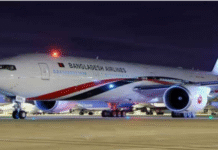The US decision to suspend the GSP facilities for Bangladesh will not help of workers, though the move was made to press the government into implementing their rights, ready-made garment workers’ bodies say.
They fear that similar steps by the European Union after the ‘tough’ US action would badly damage Bangladesh’s garment sector and hurt the industry’s 3.6 million workers.
US President Barack Obama early on Friday (Bangladesh time) announced the suspension of the US preferential trade benefits for Bangladesh in a mostly symbolic response to dangerous conditions in the garment industry that have cost more than 1,200 lives over the past one year.
However, the US sanction does not directly affect Bangladesh’s main export, multi-billion-dollar clothing to the United States, since garments are not eligible for duty cuts under the Generalized System of Preference, or the GSP programme.

However, justifying the decision, US ambassador in Dhaka Dan W Mozena on Friday said his country’s decision would serve as ‘the first step’ in ensuring that devastations like the Rana Plaza building collapse or the Tazreen factory fire never occur again in Bangladesh.
“It’s not cancellation, it’s suspension,” he said calling for actions to regain the facility.
Meanwhile, the US said Bangladesh might regain the facility if it could improve the working environment in the factories and implement the labour rights.
Bangladesh Textile Garment Workers Federation President Mahbubur Rahman Ismail told bdnews24.com: “They [US] are saying this was done for the sake of the workers. But this will not help them. Rather they could have pressured the government to ensure compliance in garment factories, international standard salary and the right to form trade unions.”
Ismail feared the US decision would affect the market in Europe.Garment Owners-Workers Unity Forum President Moshrefa Mishu is seeing the GSP suspension as a ‘step against Bangladesh’s interest’.
Mishu told bdnews24.com: “This is cannot be supported. This is illogical.”
Dubbing the US position ‘immoral’, Mishu said, “Now, if Europe does the same, the entire industry will be endangered. In that case, over 10 million people directly and indirectly involved in this industry will be in trouble.”
However, the Bangladesh Garment and Industrial Workers Federation President Babul Akhtar feels that the government steps to improve the working environment and hike the pay after the Tazreen Fashions factory fire and Rana Plaza collapse were positive.
The US decision to suspend the GSP facility without considering the government moves were wrong, he said.
Babul said, “Most of the brands from Europe have signed a safety agreement named ‘Building and Fire Safety’, which is already being implemented.”
“I don’t think the suspension of GSP at this point will affect the European market,” he added.
Trade Union Federation President Shah Atiul Islam seemed to agree.
In 2012, Bangladesh was spared about $2 million in US duties on about $35 million worth of goods under GSP programme, but it paid about $732 million in US duties on $4.9 billion of clothing exports not covered by the programme.
According to the Export Promotion Bureau (EPB), Bangladesh exported goods worth over $24 billion in the 2011-12 fiscal year. Of the total, 21 percent ($5 billion) was exported to the US.
On the other hand, the EU imported roughly 9.2 billion euros ($12.13 billion) worth of commodities from Bangladesh last year, according to the EU’s executive, the European Commission.
Meanwhile, the Ministry of Foreign Affairs in a press release on Friday responded to the US decision saying, “It cannot be more shocking for the garment factory workers of Bangladesh that the decision to suspend GSP comes at a time when the Government of Bangladesh has taken concrete and visible measures to improve factory safety and protect workers’ rights.”
The government termed the US move unfortunate and expected that the Obama administration to soon restore Bangladesh’s GSP status, a benefit an underdeveloped country was entitled to from the developed world as per the provisions of the World Trade Organization.
But the garment owners and businessmen involved in the $20 billion sector believe the US decision was a ‘political move’ intended to make Bangladesh toe its line.
However, a former President of the BGMEA has said that the door for talks was open as the government had recently approved the draft of the Trade and Investment Cooperation Forum Agreement (Ticfa).
Source: Bd news24









